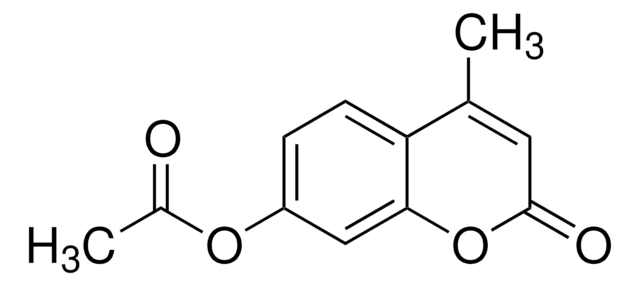M8883
4-Methylumbelliferyl phosphate
phosphatase substrate, fluorogenic, ≥98% (HPLC), powder
Sinónimos:
4-Methylumbelliferyl-phosphoric acid
About This Item
Productos recomendados
product name
4-Methylumbelliferyl phosphate, phosphatase substrate
description
phosphatase substrate
Quality Level
assay
≥98% (HPLC)
form
powder
solubility
water: 25 mg/mL, clear to very slightly hazy, colorless
fluorescence
λex 319 nm; λem 384 nm (pH 9.1)
λex 360 nm; λem 449 nm (Reaction product)
storage temp.
−20°C
SMILES string
CC1=CC(=O)Oc2cc(OP(O)(O)=O)ccc12
InChI
1S/C10H9O6P/c1-6-4-10(11)15-9-5-7(2-3-8(6)9)16-17(12,13)14/h2-5H,1H3,(H2,12,13,14)
InChI key
BCHIXGBGRHLSBE-UHFFFAOYSA-N
¿Está buscando productos similares? Visita Guía de comparación de productos
Application
Biochem/physiol Actions
Substrates
Storage Class
11 - Combustible Solids
wgk_germany
WGK 3
flash_point_f
Not applicable
flash_point_c
Not applicable
ppe
Eyeshields, Gloves, type N95 (US)
Certificados de análisis (COA)
Busque Certificados de análisis (COA) introduciendo el número de lote del producto. Los números de lote se encuentran en la etiqueta del producto después de las palabras «Lot» o «Batch»
¿Ya tiene este producto?
Encuentre la documentación para los productos que ha comprado recientemente en la Biblioteca de documentos.
Los clientes también vieron
Nuestro equipo de científicos tiene experiencia en todas las áreas de investigación: Ciencias de la vida, Ciencia de los materiales, Síntesis química, Cromatografía, Analítica y muchas otras.
Póngase en contacto con el Servicio técnico












